|
|
|
Sort Order |
|
|
|
Items / Page
|
|
|
|
|
|
|
| Srl | Item |
| 1 |
ID:
124758
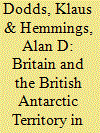

|
|
|
|
|
| Publication |
2013.
|
| Summary/Abstract |
Britain's contemporary and future relationship with the British Antarctic Territory and the wider region is the subject matter of this article. In the aftermath of the ill-fated plans for a merger of British Antarctic Survey (BAS) and the National Oceanography Centre, it is timely to ask how the UK projects influence and secures its scientific, resource and strategic interests. The contemporary Antarctic is increasingly characterized by tension over resource management and conservation politics as Antarctic Treaty parties disagree, both in private and public, over the purpose of legal instruments and the regulation of activities such as fishing and marine conservation. While we do not predict the collapse of the Antarctic Treaty System (ATS), our analysis suggests that the effectiveness and legitimacy of the ATS is increasingly under challenge. The United Kingdom's position as a claimant state and original signatory to the Antarctic Treaty is complicated by the presence of counter-claimants (Argentina and Chile) and a wider preoccupation with other overseas territories, such as South Georgia and South Sandwich Islands and the Falkland Islands. Polar science, carried out by BAS and other British agents, remains critical not only for maintaining the UK's 'soft power' but also increasingly for cementing a 'strategic presence' in the Antarctic. The article ends with a cautionary note: scientific excellence is no longer sufficient to guarantee geopolitical/strategic interests and there is growing evidence that claimant and non-claimant states alike are no longer regarding Antarctica as an area that will remain free of intensifying and diversifying resource exploitation.
|
|
|
|
|
|
|
|
|
|
|
|
|
|
|
|
| 2 |
ID:
131444
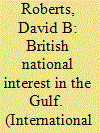

|
|
|
|
|
| Publication |
2014.
|
| Summary/Abstract |
The British government is in the process of re-energizing its relations with the Gulf states. A new Gulf strategy involving a range of activities including more frequent elite bilateral visits and proposals sometimes touted as Britain's military 'return to east of Suez' are two key elements of the overarching strategy. Such polices are designed to fall in line with British national interest as identified by the government-authored 2010 National Security Strategy (NSS), which emphasizes the importance of security, trade, and promoting and expanding British values and influence as perennial British raisons d'etat. In the short term, the Gulf initiatives reflect and compliment these core interests, partly based on Britain's historical role in the region, but mostly thanks to modern day trade interdependencies and mutually beneficial security-based cooperation. However, there is yet to emerge a coherent understanding of Britain's longer-term national interest in the region. Instead, government-led, party-political priorities, at the expense of thorough apolitical analysis of long-term interests, appear to be unduly influential on the origins of both the Gulf proposals and the NSS conclusions themselves. Without a clear strategic, neutral grounding, both the Gulf prioritization and the NSS itself are weakened and their longevity undermined.
|
|
|
|
|
|
|
|
|
|
|
|
|
|
|
|
| 3 |
ID:
124234
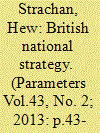

|
|
|
|
|
| Publication |
2013.
|
| Summary/Abstract |
Since 2010, four Parliamentary committees have criticized Britain's failure to promote its capacity for strategy making. Publicly, this failure is identified with the decisions of 2002-03, and especially with the invasion of Iraq. But the 1998 Strategic Defence Review was in trouble before the 9/11 attacks because it was underfunded. More culpable was Britain's failure to learn and adapt in 2006. The formation of the National Security Council by the 2010 coalition has yet to deliver.
|
|
|
|
|
|
|
|
|
|
|
|
|
|
|
|
| 4 |
ID:
125192
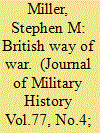

|
|
|
|
|
| Publication |
2013.
|
| Summary/Abstract |
This essay explores the impact of late Victorian cultural assumptions on the conduct of the South African War of 1899-1902, both at home and on the battlefield. It contends that three cultural values, intrinsic to late Victorian culture--cosmopolitanism, political egalitarianism, and race--shaped British soldiers' sense of justice at the outset of the war and, as a result, influenced their actions on and off the battlefield. This article emphasizes that the numerous "small wars" fought by British armies in the late nineteenth century, of which the South African War was the largest, were each unique and worthy of study not just as political history but as cultural military history
|
|
|
|
|
|
|
|
|
|
|
|
|
|
|
|
| 5 |
ID:
124761
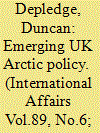

|
|
|
|
|
| Publication |
2013.
|
| Summary/Abstract |
How is the United Kingdom engaging with changing geopolitics of the Arctic in the twenty-first century? This article considers the UK's contemporary interest(s) in the Arctic at a time of unprecedented change in the northern latitudes of our planet. In particular, it focuses on the ongoing emergence of UK Arctic policy as an assemblage of processes involving various actors-government officials, scientists and other academics, environmental campaigners, journalists and the private sector-which not only define UK interests but also delimit what the term 'Arctic' means to, and demands of, the UK. The focus of the article is directed at the recent activities by the Ministry of Defence, the House of Commons Environmental Audit Committee and the related work of the Foreign and Commonwealth Office to develop an Arctic Policy Framework, drawing on official government documents and a series of interviews conducted between 2010 and 2013 for evidence. The article concludes with the author's thoughts on tensions and contradictions that remain in the UK's policy towards the Arctic and the implications this might have at a time when global interest in the Arctic is growing rapidly.
|
|
|
|
|
|
|
|
|
|
|
|
|
|
|
|
| 6 |
ID:
132414
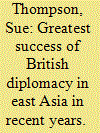

|
|
|
|
|
| Publication |
2014.
|
| Summary/Abstract |
Arthur de la Mare, an under-secretary of state at the British Foreign Office, wrote in 1967 that the ending of the Malaysia-Indonesia Confrontation of 1963-1966 was "the greatest success of British diplomacy in East Asia in recent years." However, historians generally believe British influence in the process to end this conflict was extremely limited, as it has been widely accepted that this conflict ended through bilateral negotiations between Jakarta and Kuala Lumpur. On one level, this view is accurate, but "Confrontation" took months to end and, during this process, British, American, and Malaysian officials hoped to encourage a change in leadership in Jakarta and an eventual end to the conflict. Confrontation was an anti-colonial and a regional dispute greatly affected by the Cold War environment in Southeast Asia and, therefore, not immune from international events or actors, especially the final phase of the conflict
|
|
|
|
|
|
|
|
|
|
|
|
|
|
|
|
| 7 |
ID:
128848
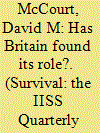

|
|
|
|
|
| Publication |
2014.
|
| Summary/Abstract |
The question is not whether Britain is a great power, but whether it does what great powers do. In the absence of wider changes, Britain will continue to play this role. 'What is Britain's role in the world?' Answering this question is a vital step in a successful review of British security and defence provision. The conclusions of the latest chapter of this review process will be published in 2015, in an update to the 2010 Strategic Defence and Security Review (SDSR), which was itself the first for 12 years. The 2010 SDSR declared that 'any strategy for our national security must begin with the role we want to play in the modern world.' As Liberal Democrat Member of Parliament Menzies Campbell put it, 'the central question is: what role do we want Britain to play, and how much, as a nation, are we prepared to pay?' Defence reviews are thus about more than how many guns, ships and aircraft the armed forces will have at their disposal; they are concerned with thinking holistically about Britain's place in the world.
|
|
|
|
|
|
|
|
|
|
|
|
|
|
|
|
| 8 |
ID:
131454
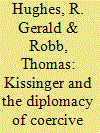

|
|
|
|
|
| Publication |
2013.
|
| Summary/Abstract |
The majority of scholarly accounts suggest that Anglo-Americans throughout the era of détente, 1969-1977, were often fraught with difficulties. In particular, the relationship between the Nixon administration and the British government of Edward Heath is often seen as the nadir for the Anglo-American relationship during the Cold War. Nonetheless, elements of the Anglo-American "special relationship," particularly those related to intelligence and nuclear co-operation, are often seen by scholars to have operated outside of these wider political difficulties. By utilising recently declassified documentation from both U.S. and UK archives, it is shown that both intelligence and nuclear co-operation were continually used by the United States as a means of convincing London to follow more amenable policy lines. With Henry Kissinger very much to the fore, it is illustrated how this coercive diplomacy had mixed results in achieving what Washington desired. Ultimately, this policy line would not accomplish what its main adherent, Henry Kissinger, sought.
|
|
|
|
|
|
|
|
|
|
|
|
|
|
|
|
| 9 |
ID:
124420
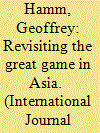

|
|
|
|
|
| Publication |
2013.
|
| Summary/Abstract |
The history of the Great Game in Asia, the contest between the British Empire and the Russian Empire for control of Central Asia, is dominated by popular writers attempting to uncover the "true" story of Rudyard Kipling's Kim, the story of the an orphaned Anglo-Irish son of a British soldier growing up in the streets and bazaars of British India. These books, often lacking any sense of historical context or a broader political narrative, tend to forego judicious historical analysis in favour of salacious adventure stories.
|
|
|
|
|
|
|
|
|
|
|
|
|
|
|
|
|
|
|
|
|